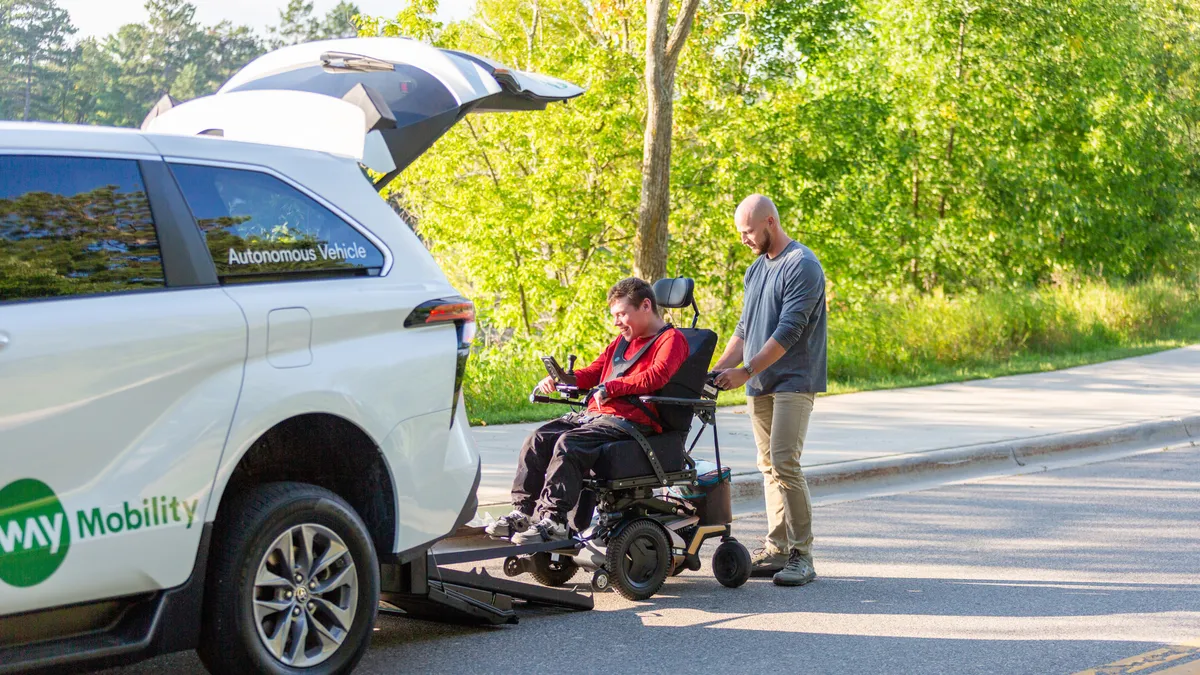Robotaxi companies like Cruise and Waymo have operated in several cities, raising concerns about local control and safety. But a lesser-known autonomous transportation provider is not only welcomed by some cities but contracted by them.
Founded in 2017, May Mobility currently operates in six U.S. cities, ranging from Miami and Detroit to the retirement community of Sun City, Arizona, and rural parts of Grand Rapids, Minnesota. “What we're doing is trying to right-size the rollout of autonomous vehicle technology in a way that is best for cities,” said Edwin Olson, May Mobility’s chief executive officer.
The company rolled out a pilot program in Detroit on June 20 for residents 62 years or older or who live with disabilities. The route covers 68 stops over an 11-square mile area of downtown Detroit, operating every day except Tuesday. “This free, innovative service will provide safe and efficient transportation, greatly improving access to essential services for residents who have faced difficulty navigating their needs in the city,” said Tim Slusser, chief of the city of Detroit’s Office of Mobility Innovation, in a statement.
An 18-month pilot program with five self-driving vehicles in Grand Rapids, Minnesota, was extended and expanded in June to two years with the help of a federal grant. The program, developed with the support of the Minnesota Department of Transportation, aims to serve those without a private vehicle or who have mobility challenges. “Since the very early days of the company, we invested in creating wheelchair-accessible versions of our vehicles,” Olson said. Eight percent of riders in Grand Rapids are wheelchair users, according to May Mobility.
“The value to a community of having accessible vehicles goes far beyond the value to the people who directly use those vehicles,” Olson said. “It also is creating value for members of society at large to see that we care about everyone in our communities including people who may be injured or have disabilities.” He sees an opportunity for AVs to make public transit better than owning a car.
Each city determines if it wants to charge a fee or provide the service at no cost to users, said Olson. Of the six communities May Mobility is currently active in, only one charges riders: Arlington, Texas, charges the public $3 per ride, although students and staff at the University of Texas at Arlington ride for free.
The AV company also works with transit agencies. Earlier this month, Southwest Transit, which serves Minneapolis’ SouthWest Metro area, signed a three-year contract with May Mobility to provide microtransit service in Eden Prairie, Minnesota. May Mobility will provide first- and last-mile service to transit hubs with a fully wheelchair-accessible fleet of five autonomous vehicles.
“The most straightforward way that we collaborate with cities is that a city will identify a need,” Olson said, such as filling a gap in transit service. May Mobility will then respond to a request for proposals. “We provide the vehicles, we provide the autonomy technology, we provide the vehicle servicing, we provide the data, data analysis and reporting,” he explained.
May Mobility provides a live data feed to its customers and partners, allowing them to get real-time information about the status of the vehicles and whether they're in autonomous mode or experiencing maintenance issues, Olson said. Most of May Mobility’s deployments include safety drivers but they began operating driverless vehicles in December in Sun City, he said.
“One of the places where I think a lot of AV companies have run into trouble is that they ended up with almost antagonistic relationships with the cities and regulators,” Olson said. “But we've really flipped that around, in that the city is our customer. The city is the one that is paying us to operate there.”
May Mobility counts Toyota, State Farm, BMW and Japanese communications company NTT among their investors. Representatives of NTT and Toyota sit on May Mobility’s board of directors.












